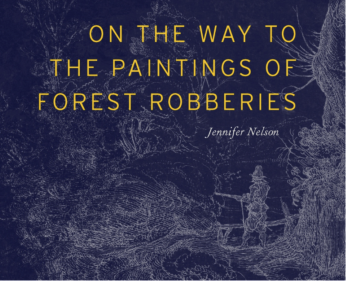Philly Poetry Chapbook Review is pleased to feature Jennifer Nelson’s poem “The Prize of Québec” as our first monthly featured poem from a full-length book for Issue 8: Spring 2025. You can find more poetry in their forthcoming book, On the Way to the Paintings of Forest Robberies now available from Fence Books.
The Prize of Québec
In this world the dead
are labeled “victory.”
The dead and one
upright man akimbo and another
releasing a bayonet and what
looks like a small grenade.
Scholars misinterpret
images for a living, call them
worlds, a synecdoche
based on faith in the moment
of creation. Here triple pairs
of caption-clouds, “French regulars” “Canadians”
“and Indians,” yield
to red. Even the wind
blows against Québec.
Where I am from in part. I remember
scaling the cliffs of Monterey
and telling K-Sue in almost real time
the moment I knew my ancestors
had taken both sides of big harm. The narrows
here are invisible, the river one-sided
as a lake. Three hundred years ago
the smoke was erased. The general’s
assistant sketching wasn’t
trying to be right, just
mechanical with organized
death. How to signal victory. Dawn
like a couch on the horizon
and very few
blobs of smoke. Clear
lines of men and ships
have passed the night
in relative silence. The moon
according to Google
had just entered its last quarter, so
the boats must have come
in near total darkness,
elided here for relentless dawn,
the divan. But really
that’s what the killers would remember:
the quarter sliver of the moon
glancing off the dark
meniscus of the river, the sweat
in the black-red wool
stuffing the boats, and the dim
occasional torches of this Québec,
which they would end.
After the smoke that looks so moderate here
but was probably actually choking, long after
hearing the general had died, sometimes
at night the soldiers would think
of those hard hours
of clarity, rowing
against the water
against a tiny moon
that is still there almost beside the world, precisely
not watching
whenever we look. On it
ruined flags point back at us.
About the Poem
First drafted in September 2020, this is an ekphrasis of a picture that may not exist. I tend to lean into the transconstitutory powers of ekphrasis. I enjoy when I lose an ekphrastic poem’s “source.”
Nevertheless, I spent some time today trying to find the “real” picture. If it does exist, it is a further annotated version of the Laurie and Whittle 1797 print, based on an eyewitness sketch by military topological painter Hervey Smythe, of the 1759 “Prise de Quebec” or Battle of the Plains of Abraham (named for the fields’ erstwhile farmer).
The version I have saved on my computer lacks the captions I describe in the poem. It’s in a folder for a class prep I don’t remember at Michigan almost ten years ago, apparently themed around European depictions of the capitulations of Indigenous peoples. I am partly French Canadian, but doubt I had any ancestors here long enough to have participated in the Franco-Indigenous alliance against the British. In every published source I have seen, the “Indian” allies remain unspecified.
Only in poetry can one go to the moon in a way that critiques the quest for the moon.
Author Bio

Jennifer Nelson is the author of four books of poetry and two books of art history. An associate professor of early modern art history at the University of Delaware, they live in Philadelphia.
From On the Way to the Paintings of Forest Robberies
These poems give voice to Nelson’s encounters with turbulent surfaces, from the twisted spectacles of the contemporary world–geopolitical, epistemological, and local–to esteemed artworks inseparable from the legacies of colonialism.
Faced with the asymmetrical warfare, incessant pandemics, and climate calamities of the 2020s, these poems offer no simple solace. With wit, they plumb the wrecked relations between academic knowledge practice and any sort of liberatory praxis. They reject the manic digital buffet proffered as antidote to the poet’s anger, guilt, and grief by late techno-capitalism’s cultural productions.
Gazing into and grappling with the act of seeing, these poems blaze a path through forests of data and life, the ensnarled techno-webs of information and plunder. Here, the poet allows us to see beyond what and whom first meets the self’s eye. Here one may press into the “loam of the forest floor, / the ongoing of the unremembered / and those remembered wrong.”
Though it may be the case that “the world is dying,” this book’s hope is that we may, at least, persist in a form of radically productive negativity: “Let being and making / be the fullest / forms of grief.” Jennifer Nelson’s deep knowledge, care-for-the-world, and capacious attention infuse this collection and the reader with wavelengths of bracing and inclusive light.

Contents
Book Excerpt: The Prize of Québec by Jennifer Nelson
“I tend to lean into the transconstitutory powers of ekphrasis. … Only in poetry can one go to the moon in a way that critiques the quest for the moon.” Read a poem from Jennifer Nelson’s new collection from Fence Books, On the Way to the Paintings of Forest Robberies.
Chapbook Poem: This Is How They Teach Us How to Want It . . . by Shanta Lee
“This poem explores the levels of our participation in handing ourselves over, often to the people, places, or things that deserve no such delight.” Read a #poem from Shanta Lee’s new book from Harbor Editions, This Is How They Teach Us How to Want It . . . The Slaughter.
Three Poems by Jonathan Fletcher
“Instead of having to choose between religion or the LGBTQ community (which I know many member of the latter feel they have to do), I think it is possible (and maybe even biblical) to integrate both into one’s life.” Read three original poems from Jonathan Fletcher, along with words from the author.
What Happened? On You are Leaving the American Sector by Rebecca Foust
“Rebecca Foust’s new chapbook of poems has a strange prescience. … Foust isn’t alone in making the obvious connection between Trump’s first term and Orwell’s dystopia.” Read the full chapbook review by new contributor Rick Mullin.
‘What if we started creating together? What if we looked at who we are from the side and saw a much more complete and honest perspective?” Read four poems by poet Sarah E N Kohrs, along with words from the poet.
Book Excerpt: Challenger by Colleen S. Harris
“If we look beyond the voyeuristic tendency to focus on the tragedy, what might we see? This poem was a chance for me to zoom in on the calm before the storm.” New poem from Colleen S. Harris’s new book from Main Street Rag, The Light Becomes Us, along with words from the poet.
Chapbook Poem: What I Did This Summer by Elinor Serumgard
“I love New Year’s and the promise of a new start, but I like to remind myself that you can start fresh at any point throughout the year.” New poem from Elinor Serumgard’s chapbook from Bottlecap Press, Analogous Annum, along with words from the poet.
Four Poems by Christa Fairbrother
“Since women aren’t allowed the power of our anger, we take it out on each other, and that’s what this poem is hinting at.” Read four poems by Christa Fairbrother, along with words from the poet.
Multilingualism and Metaphor: On Desire/Halves by Jaia Hamid Bashir
“Bashir’s elegant debut collection investigates identity as the result of choices between individual appetites and cultural frames. … [It] announces an exciting addition to the global chorus of contemporary literature.” Read D.W. Baker’s full review.
Five Poems by Jane Ellen Glasser
“In my fantasy world, I would be able to communicate with the animals I see every day.” Read five naturalist poems by poet Jane Ellen Glasser, along with a few words from the poet.
Book Excerpt: Ars Poetica by Leigh Sugar
“[C]ould there be, a poetry that does investigate the body, without explosion? Maybe even with an effort towards reconstruction?” Read an excerpt from Leigh Sugar’s book, FREELAND, from Alice James Books, along with words from the author.
“…she has a sense of style, a modicum of grace, and she recognizes her place in the cosmic order, where revolution rules every other Wednesday and twice, of course, on Sundays…” Read three poems by Bart Edelman along with words from the poet.
Chapbook Poem: I Worry by Flavian Mark Lupinetti
“I can’t begin to imagine doctors in Gaza courageously practicing medicine while intentionally targeted by the Israeli army aided by the United States.” Read the featured Chapbook Poem of the Month for June 2025, “I Worry” from The Pronunciation Part by Flavian Mark Lupinetti.
“Quantum physics leads us to the uncanny and the terrifying. I know people fear black holes, but to me they rearrange our relationship to time and to our own lives.” Read four #poems by Victoria Korth along with words from the poet.

